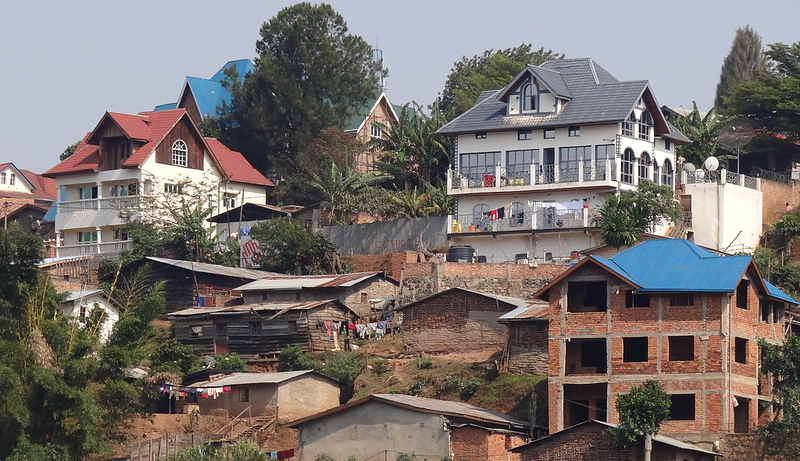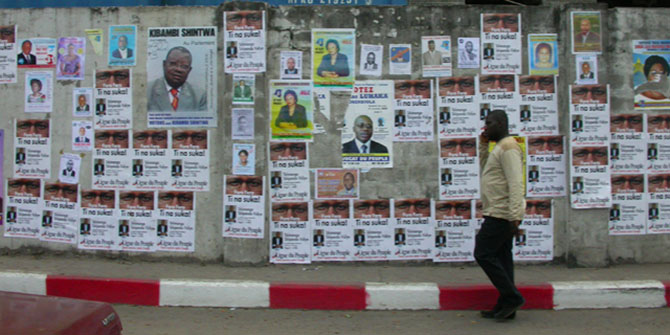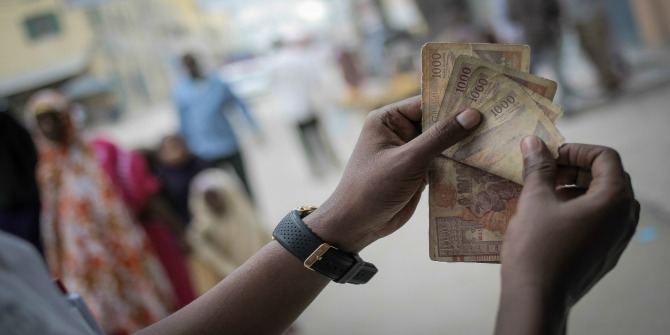Citizens in the DRC’s Panzi neighbourhood say property rights are in a state of ‘anarchy’. But far from the term’s association with crime and violence, it denotes a system where the line between legality and illegality is blurred through continuous administrative struggles over governance of land. Instead people’s property rights are determined by the political, social, coercive and financial resources they can muster.
In urban eastern Democratic Republic of Congo (DRC), land is a key resource and its attribution is of vital economic and political concern across societal groups. Land is not only important as a material resource, but it is also woven into many aspects of social life for DRC’s urban residents. Crucially, therefore, possession of land is a key determinant of power, and occupation and possession of land are important sources of prestige and self-esteem, contributing in no small way to determining people’s social, economic and political positions in society.
Hence, land issues relate to questions of property more broadly and, as such, implicate social, economic and political power relations in the widest sense.
In a recent Congo Research Brief, we analyse the nexus between property rights, land governance and land conflicts in the Panzi neighborhood of Bukavu, the provincial capital of South Kivu. Property rights are notoriously precarious in Panzi, as they are in other urban areas of eastern DRC, which has led exasperated Congolese citizens to label the complex issue of property rights as ‘property anarchy’, or ‘anarchic constructions’. We argue that these references to ‘anarchy’ and ‘disorder’ should not to be taken at face value. Instead, they are produced through daily practices of land governance.
The phenomenon of ‘property anarchy’ is not the result of a spontaneous and chaotic process of urbanisation. Instead they are to a large extent the result of a set of governance practices deployed by land authorities in which the law – paradoxically – is applied to ensure that the vast majority of people’s plots and buildings do not comply with the law. Yet, other factors are also highly important, including rural-urban migration and residents self-governance practices. Consequently, most Panzi residents’ property rights are temporal and ephemeral.
The disenfranchisement of people’s land rights is upheld by a myriad of micro-practices of power, enacted by a multitude of land authorities which compete and collaborate with each other in unpredictable patterns. In order to acquire a modicum of tenure security, Panzi’s residents tend either to circumvent the law or play along with the alternative rules imposed by the land authorities. In doing so, they involuntarily become complicit in the ‘misrule of law’. Hence, Bukavu’s property anarchy has become systemic and it affects poor people and wealthy people alike, albeit to varying degrees.
Precarity and property
Property rights are tenuous in Panzi for various reasons. First, the law stipulates that land can be reclaimed by the state if doing so is in the interest of the state. This means that land can be legally expropriated on the basis of the state’s supreme authority. Second, Panzi is a poor neighbourhood in which the majority of the population live below the global poverty line and cannot afford to acquire an official title deed. Instead, many people have alternative documents to try to protect their property issued by other statutory institutions. However, the most frequently owned document that people use to secure their property is the acte de vente (bill of sale). People in Panzi are mostly aware that the bill of sale is not enough to grant them full legal (alienable) property rights, but it is, nonetheless, used as a valid land title in transactions. Many people seem resigned to accept that the bill of sale is as good as it gets in terms of securing their property rights.
Public authority and rent-seeking
Land governance in Panzi makes residents vulnerable to rent-seeking by land authorities. The high value of land in Bukavu means that it is a highly profitable sector of public administration as authorities fine people to pay for their transgressing of the law. State officials carry out missions in Bukavu’s neighbourhoods seeking transgressions to issue fines for, or fees for issues they may resolve. It is easy to find plots and constructions in Panzi that do not comply with regulations. Due to the high density of housing and people, Panzi residents often build on sites that are unfit for construction, transgress boundaries of easements and public space or redirect overland sewers to make space for their buildings.
Land conflicts and connections
A high frequency of land conflicts is one of the consequences of Panzi’s ‘property anarchy’, and the majority of these land conflicts are over plot boundaries. Other frequent forms of land conflicts relate to the channelling of waterways, the blocking of public passageways and inheritance conflicts.
Panzi residents are not equally exposed to the same treatment by land authorities’ rent-seeking. They are also not equally likely to have a satisfactory outcome in a land conflict either. The wealthiest people are able to buy a valid title deed. This is usually enough to protect them against expropriation and encroaching neighbours or competing claims to the plot in the case of multiple claimants. Moreover, with sufficient financial means, one can pay soldiers to protect one’s property. Another effective way to protect one’s property is through influence peddling or using one’s parapluie (umbrella). In other words, people’s social and economic position in society, as reflected in the economic resources and social relations they are able to mobilise, are the main factors shaping the degree to which their property rights are recognised and sheltered.

Bukavu’s system of land governance produces, therefore, an unequal social structure where people’s economic assets and the relative power of their social relations strongly condition their access to land and property rights.
People’s property rights are withheld from them with the aim of generating resources for the land authorities. This means that land authorities use the law as an instrument to keep people in a situation of permanent illegality, which makes the latter vulnerable to extortion. Hence, when Panzi’s land authorities mobilise the law, they do not typically do so to bring people into its compliance. Instead, they use it as an instrument to threaten residents into negotiating a transgression fee or fine. In this way, Panzi residents are able to acquire a kind of temporary right to break the law.
In Bukavu, money can buy a person a plot, a house and the necessary documents to render the acquired property legal. However, in order to truly enjoy secure property rights you also need protection from powerful individuals capable of enforcing them. This makes it almost impossible for all but the wealthiest and well-connected to possess property rights perennially. But even they can become victims of this system if they enter into conflict with other elites.
Beyond anarchy: ‘Justice a deux vitesses’
Conventionally, anarchy is associated with violence and crime. Yet, our brief suggests that Bukavu’s ‘property anarchy’ is not anarchic in the word’s conventional sense. Rather, illegality is produced through the daily practices of land governance. The problem with framing the nexus between property, conflict and land governance as anarchic in the conventional sense is that it conjures up a dichotomous understanding of legality and illegality. In practice, the law does not operate in this way. Neither the law nor anarchy refers to objective universal states of being, or domains of actions. Instead, the boundary between the two is drawn through concrete power struggles. Thus, when such distinctions are evoked, we must understand them as attempts by different groups or individuals (more or less coordinated) to establish, maintain or disturb a certain political order and the distribution of power and wealth that it protects.
What is at stake in the nexus between land governance, conflict and property rights is who has the right and ability to define and impose limits between illegality and legality, even at the micro-level between neighbours. What counts as legal is not predominantly determined by the law, but rather through struggles to define or impose a certain definition of ‘anarchy-order’.
The result is that people’s property rights and the outcomes of land conflicts are determined by the total political, social, legal, coercive and financial resources that they can muster. This condition of ‘anarchy-order’ has been dubbed locally as ‘justice à deux vitesses’, meaning that justice is rendered differently according to who you are, who you know and what you are worth.
Therefore, in order to understand why most of Panzi plots and buildings are illegal – that is, do not conform to the rules of the law – it would be misleading to resort to stereotypical notions of anarchy. Rather, what needs to be understood and answered is how notions of anarchy and order are employed, and in whose interest.
This post first appeared on the Conflict Research Programme blog at LSE.





